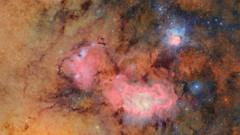In a world increasingly cloaked in darkness as the year's shortest day approaches, Dennis Overbye contemplates the vastness of the cosmos and his time as the “cosmic affairs correspondent” for The New York Times. For 25 years, he has been captivated by the enigmas of the universe, detailing how, in a fraction of cosmic time, each one of us exists at the center of an ever-expanding reality. Overbye's journalism has been guided by both awe and a sense of trepidation, prompting him to explore the intricate balance between chaos and order among the trillions of galaxies.
In his career, Overbye has ventured to significant scientific fronts, from the Large Hadron Collider in Geneva to the peaks of Chile and Hawaii, where stargazing provided countless insights into our universe. His narrative reflects a deep connection with both history and science; he witnessed groundbreaking moments, including the detection of gravitational waves and the discovery of the Higgs boson, often referred to as the "God particle." His journey underscored the importance of curiosity amid the uncertainty around dark matter and dark energy—components of the universe that remain largely mysterious.
As Overbye transitions into retirement, he plans to continue contributing to the discourse on the cosmos and aim to publish a book blending personal stories with cosmic explorations. He states that his mission—to foster wonder and discussion about the universe—is far from over, indicating a promise to the readers and the scientific community alike.
In celebrating a legacy defined by discovery and introspection, Overbye’s journey invites us all to ponder the profound mysteries around us as we navigate our individual paths within the vast universe.
In his career, Overbye has ventured to significant scientific fronts, from the Large Hadron Collider in Geneva to the peaks of Chile and Hawaii, where stargazing provided countless insights into our universe. His narrative reflects a deep connection with both history and science; he witnessed groundbreaking moments, including the detection of gravitational waves and the discovery of the Higgs boson, often referred to as the "God particle." His journey underscored the importance of curiosity amid the uncertainty around dark matter and dark energy—components of the universe that remain largely mysterious.
As Overbye transitions into retirement, he plans to continue contributing to the discourse on the cosmos and aim to publish a book blending personal stories with cosmic explorations. He states that his mission—to foster wonder and discussion about the universe—is far from over, indicating a promise to the readers and the scientific community alike.
In celebrating a legacy defined by discovery and introspection, Overbye’s journey invites us all to ponder the profound mysteries around us as we navigate our individual paths within the vast universe.











